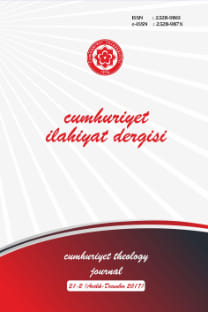İslam Hukukuna Göre İddet ve İddet Bekleyen Kadının Nikâhı
İslam hukukunda iddet, evliliğin herhangi bir sebeple sona ermesi durumunda nikâh hükümlerinin tamamen ortadan kalkması ve kadının yeni bir evlilik yapabilmesi için beklemesi gereken süreyi ifade eder. İddet, kendisine sebebiyet veren olaya göre boşanma veya ölüm iddeti olarak ikiye ayrılarak incelendiği gibi iddet süresine göre hayız, hamilelik ve süreli iddet şeklinde de ayırıma tabi tutulabilir. Racʽî talaktan dolayı iddet bekleyen kadına açık veya gizli evlilik teklifi, bâin talaktan dolayı iddet bekleyen kadına ise açık evlilik teklifinin yapılamayacağında ittifak söz konusudur. Yine vefat iddetini bekleyen bir kadına, açık evlilik teklifi yapılamazken üstü kapalı evlilik teklifi yapılabileceğinde ittifak edilmiştir. Yasak olmasına rağmen iddet halinde yapılmış olan evliliğin, fark edildiği anda iptal edilmesi ve tarafların tefrik edilmesinde İslam hukukçuları arasında ittifak, tefrik edilen tarafların iddet bittikten sonra yeniden evlenip evlenemeyeceklerinde ise ihtilaf söz konusudur.
Anahtar Kelimeler:
Talak, İddet, Nikâh, Cinsel Beraberlik
The Iddet Time and the Marriage of the Woman Waiting Iddet Time According To Islamic Law
In the Islamic Law, Iddet means the disappearence of the marriage principles with the ending of the marriage because of any reasons and the time must be waited for another marrige by the woman. Iddet can be classified in two with regard of the causes of the action giving rise the divorce as the iddet of divorce and death, and it also can be subjected to a classification for the time of iddet as menstruation, pregnance and periodical iddet. As it is impossible to make a marriage proposal to a woman who is waiting the time of iddet directly or indirectly, there is an agreement on the subject of the impossibility of making a marriage proposal to a woman directly. As it is not possible to make a marriage proposal to a woman waiting iddet of death directly, an indirect proposal is possible only with an agreement. There is an agreement among the Islamic Lawyers on the subject of canceling the marriage which has taken place notwithstanding the ban, but the agreement isn't available about the marrige of the same couple after the time of iddet
Keywords:
Talaq, Iddet, Marriage, Intimate Encounter,
___
- Acar, H. İbrahim, “İddet”, DİA, XXI, İstanbul 2000,
- el-Babertî, Muhammed b. Muhammed (h.786), el-‘İnâye Şerhu’l-Hidâye,
- Dâru’l-Kutubi’l-İlmiyye, Beyrut 2007.
- el-Buhârî, Muhammed İbn İsmail (h.256), el-Câmiu’s-Sahîh, Dâru’lMa’rife,
- Beyrut 2010.
- İbn Mâze, Mahmûd b. Ahmed el-Buhârî (h.616), el-Muhîdu’l-Burhânî fi’lFıkhi’n-Nu’mânî,
- Dâru İhyâi’t-Turâsi’l-‘Arabî, Beyrut 2003
- ISSN: 2528-9861
- Yayın Aralığı: Yılda 2 Sayı
- Başlangıç: 1996
- Yayıncı: Cumhuriyet Üniversitesi İlahiyat Fakültesi
Sayıdaki Diğer Makaleler
Basra ve Bağdat Mu'tezile Ekollerinin Ayrılmasına Etki Eden Sebepler
İslam Hukukuna Göre İddet ve İddet Bekleyen Kadının Nikâhı
Sad Kelime Geleneği ve Sefîne-i Tebriz İsimli Mecmuada Yer Alan Sad Kelime Örneği
Sermayesi Muhabbet Bir Kitap: Geleneğin İzinde
Mantıkçı Ömer Feyzi Tokadî ve Dürrü’n-Nâcî İsimli Eseri
Ebu Hayyan’a Göre Cümlenin İrabı ve Gramer Kurallarının Anlama Etkisi Bakara Suresi Tefsiri Örneği
